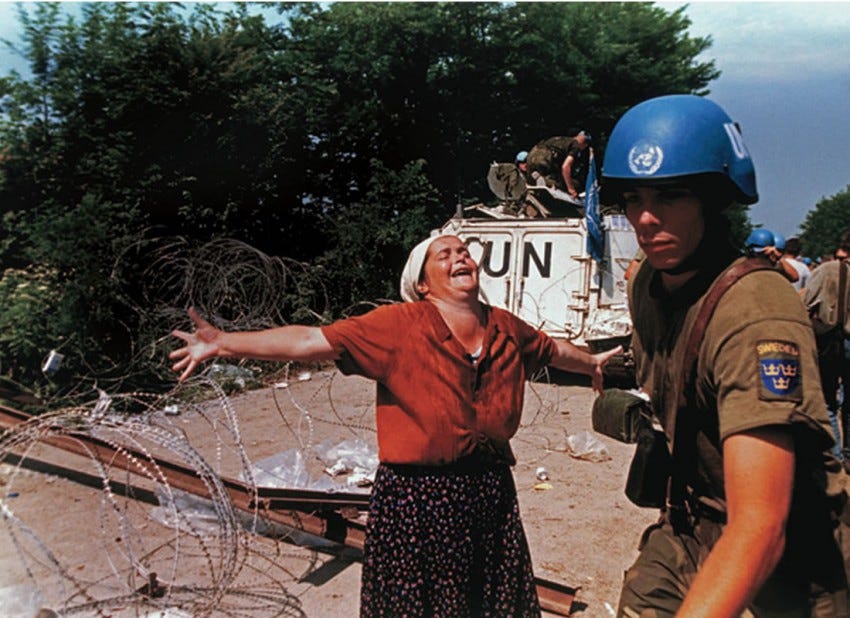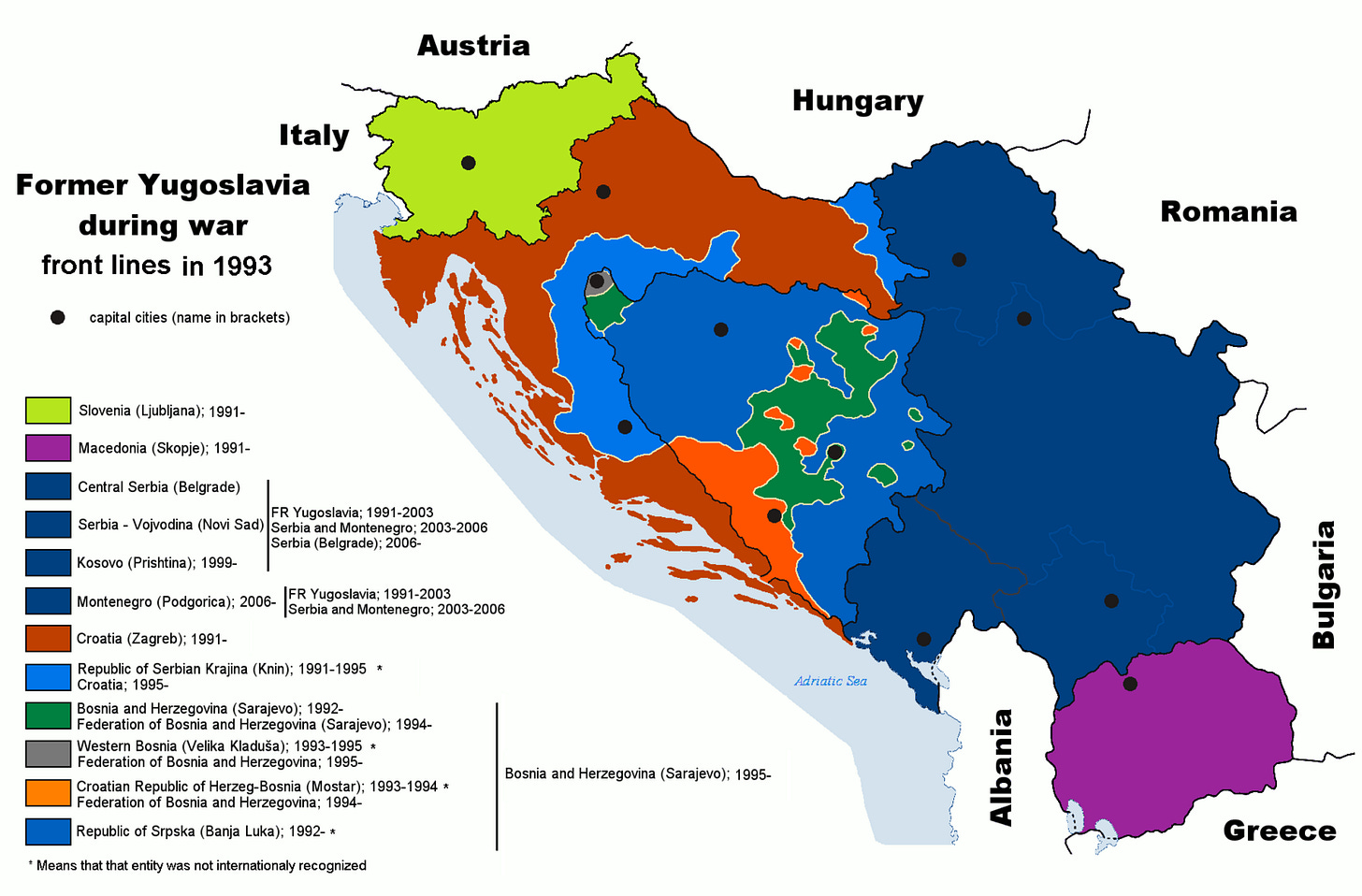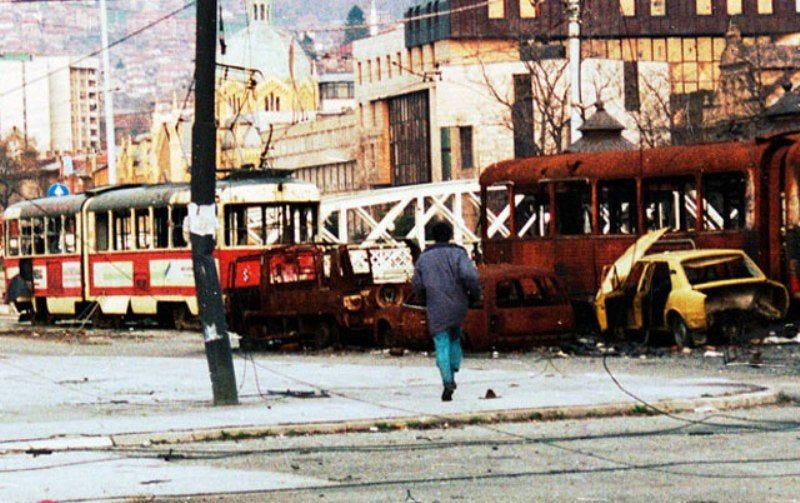February 1993.
The new year has started with an intense diplomatic effort aimed at finding a solution among all Bosnian, Balkan and international actors to end the war in Bosnia and Herzegovina [you can listen to the latest episode of BarBalkans - Podcast here].
The Vance-Owen Plan does not find unanimous support, in particular on the new post-war territorial organization.
As the fighting intensifies in both Bosnia and Croatia - and the Croatian President, Franjo Tuđman, is threatened by French warships in the Adriatic - the international community tries to strike a diplomatic balance.
But a major political actor comes into play. The new President of the United States, Bill Clinton.
Breaking promises
The two proponents of the latest peace plan for Bosnia and Herzegovina - the European Community negotiator for the former Yugoslavia, David Owen, and the UN Special Envoy to Bosnia, Cyrus Vance - fly to Washington.
They seek support to their Plan from the new U.S. administration. But they find an unpleasant surprise.
President Clinton has decided to take a hard line on foreign policy in the Western Balkans, in contrast with the European partners.
He harshly criticizes the Geneva negotiations for putting victims and perpetrators on the same level and for legitimizing Serbian policy of conquest.
The two diplomats are confident that President Clinton cannot afford to push too hard against British and French allies. But their political pressure does not seem to have any effect on the apparently intransigent U.S. administration.
However, despite all the ambitious declarations, the new Democratic President is not taking a different path from his predecessor, George H. W. Bush. He is not willing to take the ultimate step and send U.S. soldiers to Bosnia as part of the United Nations Protection Force (UNPROFOR).
Clinton’s harsh criticism on the European diplomatic compromise is supported in Brussels.
On February 1, a committee chaired by Ann Warburton presents the results of investigations into Serbs and Bosnian Serbs’ violence against Muslim women in Bosnia to the Foreign Ministers of the European Community.
In less than a year of war, at least 20 thousand women and girls have been raped (and in some cases killed) in a deliberate project of ethnic replacement.
Considering this tragedy, German MEPs call for armed intervention against Serbia, to put an immediate end to the war.
This request has no real hope of being considered by the 12 governments of the European Community. Even if it gives a voice to the growing unease among the European population on the clear violations of human rights in the Balkan country.
President Clinton's turnaround
However, President Clinton’s position is undermined by the military establishment, determined not to get involved in the Balkan armed tangle.
And almost unexpectedly, an assist arrives from Moscow.
The President of the Russian Federation, Boris El’cin, needs to give a decisive response to mounting pressure from “red-browns” (the communist and imperialist forces), the Orthodox clergy, Cossack and military circles.
Since December 1992, he is accused of abandoning Serbian “Orthodox brothers" with his non-engagement policy in the Balkans, that would also endanger Russia itself.
This is why El’cin decides to reverse his position and adopts an 8-point document concerning the war in Bosnia.
Moscow officially supports the Vance-Owen Plan.
Fazed by the Russian President’s move - and pressured by the Pentagon not to provide any pretext for a national-communist coup d’etat in Russia - Clinton decides to soften his anti-Serbian positions.
With his turnaround, he accepts the main points of the Vance-Owen Plan.
On February 10, Secretary of State Warren Christopher presents a 6-point program that «actively and directly» engages the U.S. administration in the peace process.
President Clinton does not completely abandon his idealism, as he wants to convince Serbs, Croats and Bosniaks to engage in dialogue, without forcing anyone to accept unwelcome measures.
In the meantime, he threatens new economic sanctions against Belgrade, if the conflict will spread to Kosovo and Macedonia.
Provide Promise and International Tribunals
Among U.S. diplomatic turnarounds, the conflict in Bosnia and Herzegovina continues with the violent Serb counteroffensive in the Drina Valley.
The authorities of Sarajevo seek to draw international attention with an extreme act: on February 12, they announce a boycott of UN humanitarian aid distribution.
This boycott causes a violent clash with the United Nations High Commissioner for Refugees, Sadako Ogata. Five days later, he orders to stop operations on Bosnian territory and to withdraw UNHCR staff from the capital city.
The UN Secretary-General, Boutros Boutros-Ghali, avoids the worst and stops Ogata’s order. Also considering the unpopularity of the Bosnian government’s measure among the citizens of Sarajevo.
However, the tension between the UN and the Bosnian authorities has another direct consequence.
On February 22, the UN Security Council adopts Resolution 808, sanctioning the birth of an international tribunal to prosecute those responsible for human rights violations on the territory of former Yugoslavia since 1991.
A criminal tribunal (inspired by Nuremberg and Tokyo) to prosecute war crimes in Croatia and Bosnia and Herzegovina. It would complement the International Court of Justice (ICJ) in The Hague, responsible for disputes between sovereign States.
Not yet established, the International Criminal Tribunal for the Former Yugoslavia has to face a significant challenge. It is unclear how it should deal with defendants such as the Serbian President, Slobodan Milošević, or the President of Republika Srpska, Radovan Karadžić, who would negotiate the peace according to the Vance-Owen Plan.
Approaching the month as the undisputed protagonist of the international diplomatic scene, President Clinton decides to intervene in the peace negotiations with Sarajevo and Belgrade.
On February 23, he announces that the United States will help besieged Sarajevans with a strong support to the international Operation Provide Promise, starting from the last day of the month.
Hercules C-120 military tactical transport aircraft reach Sarajevo from the U.S. base in Frankfurt am Main, and so does German military aircraft. Bundeswehr is once again out of Germany’s borders.
The condition is a flight height between 3 and 4 thousand meters and parachuting containers full of food and medicine over the entire territory of the Bosnian capital, with no fighter aircraft.
This is the guarantee for Serbs of Bosnia that the United States will not step - military - foot into the Bosnian ethnic conflict.
If you know someone who can be interested in this newsletter, why not give them a gift subscription?
Here is the archive of BarBalkans - Podcast:
And here you can find a summary of the past years:




















Share this post